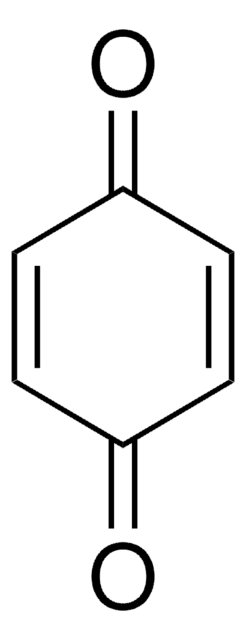H3660
Hydroquinone
meets USP testing specifications
Synonym(s):
1,4-Benzenediol, 1,4-Dihydroxybenzene, HQ
About This Item
Recommended Products
Agency
USP/NF
meets USP testing specifications
Quality Level
vapor density
3.81 (vs air)
vapor pressure
1 mmHg ( 132 °C)
Assay
99.0-100.5% anhydrous basis
autoignition temp.
930 °F
bp
285 °C (lit.)
mp
172-175 °C (lit.)
suitability
suitable for pesticide residue analysis
application(s)
pharmaceutical (small molecule)
SMILES string
Oc1ccc(O)cc1
InChI
1S/C6H6O2/c7-5-1-2-6(8)4-3-5/h1-4,7-8H
InChI key
QIGBRXMKCJKVMJ-UHFFFAOYSA-N
Looking for similar products? Visit Product Comparison Guide
Signal Word
Danger
Hazard Statements
Precautionary Statements
Hazard Classifications
Acute Tox. 4 Oral - Aquatic Acute 1 - Aquatic Chronic 1 - Carc. 2 - Eye Dam. 1 - Muta. 2 - Skin Sens. 1B
Storage Class Code
11 - Combustible Solids
WGK
WGK 3
Flash Point(F)
329.0 °F - closed cup
Flash Point(C)
165 °C - closed cup
Personal Protective Equipment
Regulatory Listings
Regulatory Listings are mainly provided for chemical products. Only limited information can be provided here for non-chemical products. No entry means none of the components are listed. It is the user’s obligation to ensure the safe and legal use of the product.
PRTR
Class I Designated Chemical Substances
ISHL Indicated Name
Substances Subject to be Indicated Names
ISHL Notified Names
Substances Subject to be Notified Names
JAN Code
H3660-BULK:
H3660-1KG:
H3660-100G:
H3660-5G:
H3660-VAR:
Choose from one of the most recent versions:
Already Own This Product?
Find documentation for the products that you have recently purchased in the Document Library.
Customers Also Viewed
Our team of scientists has experience in all areas of research including Life Science, Material Science, Chemical Synthesis, Chromatography, Analytical and many others.
Contact Technical Service














